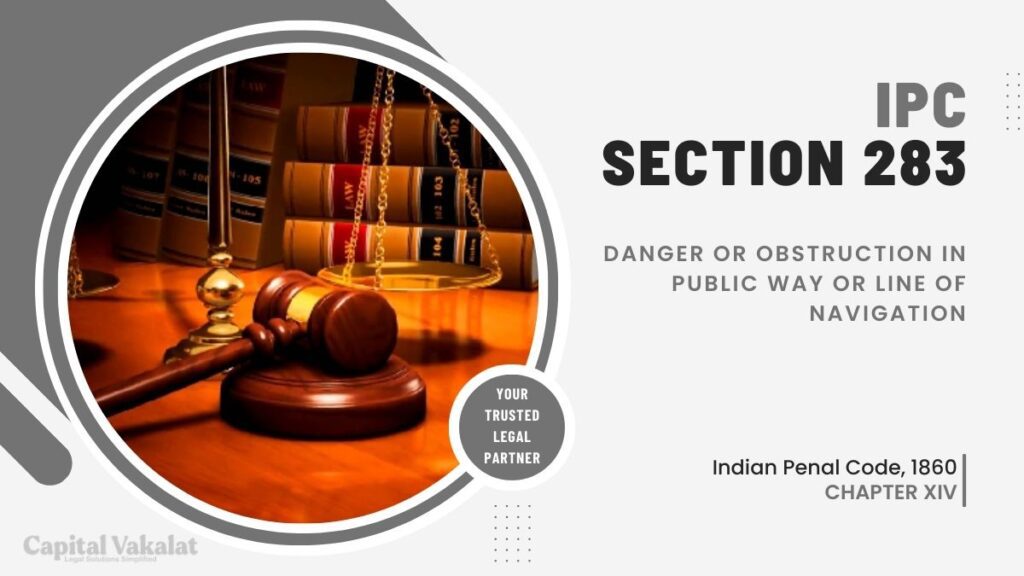Section 283 of the Indian Penal Code (IPC) deals with the offense of endangering or obstructing a public way or line of navigation. It plays a crucial role in upholding public safety, preventing accidents, and ensuring smooth transportation and navigation.

In this article, we will delve into the various aspects of Section 283 IPC, including its elements, consequences, relevance, challenges in enforcement, case studies, public opinion, societal impacts, and the role of awareness and education.
Elements of Section 283 IPC
This section primarily focuses on three key elements:
- Dangerous Acts: Section 283 IPC addresses acts that pose a danger to public safety. These acts can range from reckless driving to hazardous cargo transportation.
- Obstruction in Public Way or Line of Navigation: Any intentional or unintentional act that hinders the public way, such as blocking a road or obstructing a navigable waterway, falls under this element.
- Intent and Mens Rea: To establish an offense under Section 283 IPC, it is essential to consider the intent and mental state of the accused. Was the act committed recklessly or with the intention to endanger or obstruct?
Punishment and Consequences
Violating Section 283 IPC can result in significant legal consequences, which may include fines, imprisonment, or both. The severity of the punishment varies depending on the gravity of the offense and its impact on public safety. Offenders may also face civil liability for any damages caused.
Relevance and Application of Section 283 IPC
This section of the IPC is highly relevant in various scenarios. It addresses real-life concerns related to public safety and the uninterrupted flow of transportation and navigation. It is essential to understand how Section 283 IPC is applied in practical situations, including accidents and incidents that can endanger lives and property.
Challenges in Enforcing Section 283 IPC
Enforcing Section 283 IPC can be challenging. Gathering concrete evidence, proving the intent of the accused, and navigating the legal proceedings can be complex. Delays in the legal system may hinder the prompt resolution of cases, further emphasizing the need for an efficient process.
Case Studies
Examining notable cases where Section 283 IPC was invoked can shed light on the practical application of the law. These case studies provide insights into the outcomes, legal proceedings, and lessons learned from past incidents.
Public Opinion and Section 283 IPC
Public opinion about Section 283 IPC varies. Some communities support the strict enforcement of the law to ensure public safety, while others argue that it can infringe on individual rights. Balancing the needs of society with personal liberties is an ongoing debate.
Impacts on Society and Infrastructure
Violations of Section 283 IPC can have far-reaching consequences. It may lead to economic losses, disrupt transportation systems, and result in environmental damage. Understanding the societal and infrastructural impacts is vital for evaluating the significance of this law.
The Role of Awareness and Education
Promoting awareness and education about Section 283 IPC and its implications is essential. Preventing offenses and accidents through education and safety measures can help reduce the occurrence of incidents covered by this law.
Conclusion
In conclusion, Section 283 IPC plays a critical role in safeguarding public safety and the smooth functioning of transportation and navigation. While challenges exist in its enforcement, the law’s relevance cannot be denied. Striking a balance between individual rights and societal needs remains a continuous debate, making awareness and education pivotal in preventing violations. It is essential to remember that upholding public safety is a collective responsibility that requires a comprehensive approach.
Frequently Asked Questions
What are the potential consequences of violating Section 283 IPC?
Violations of Section 283 IPC can lead to fines, imprisonment, or both, depending on the severity of the offense. Offenders may also face civil liability for any damages caused.
How can the intent of the accused be determined in Section 283 IPC cases?
To establish an offense under Section 283 IPC, it is crucial to consider the intent and mental state of the accused. This can be determined through evidence, witness testimonies, and the circumstances of the incident.
What are some examples of real-life situations where Section 283 IPC is relevant?
Section 283 IPC is applicable in cases involving accidents, hazardous transportation, roadblocks, or incidents that pose a threat to public safety, such as reckless driving or obstructing public roads.
How can individuals and communities contribute to upholding public safety in the context of Section 283 IPC?
Individuals and communities can contribute by following traffic rules, reporting hazards, and promoting public safety awareness. Educating others about the importance of obeying laws related to public safety is also essential.